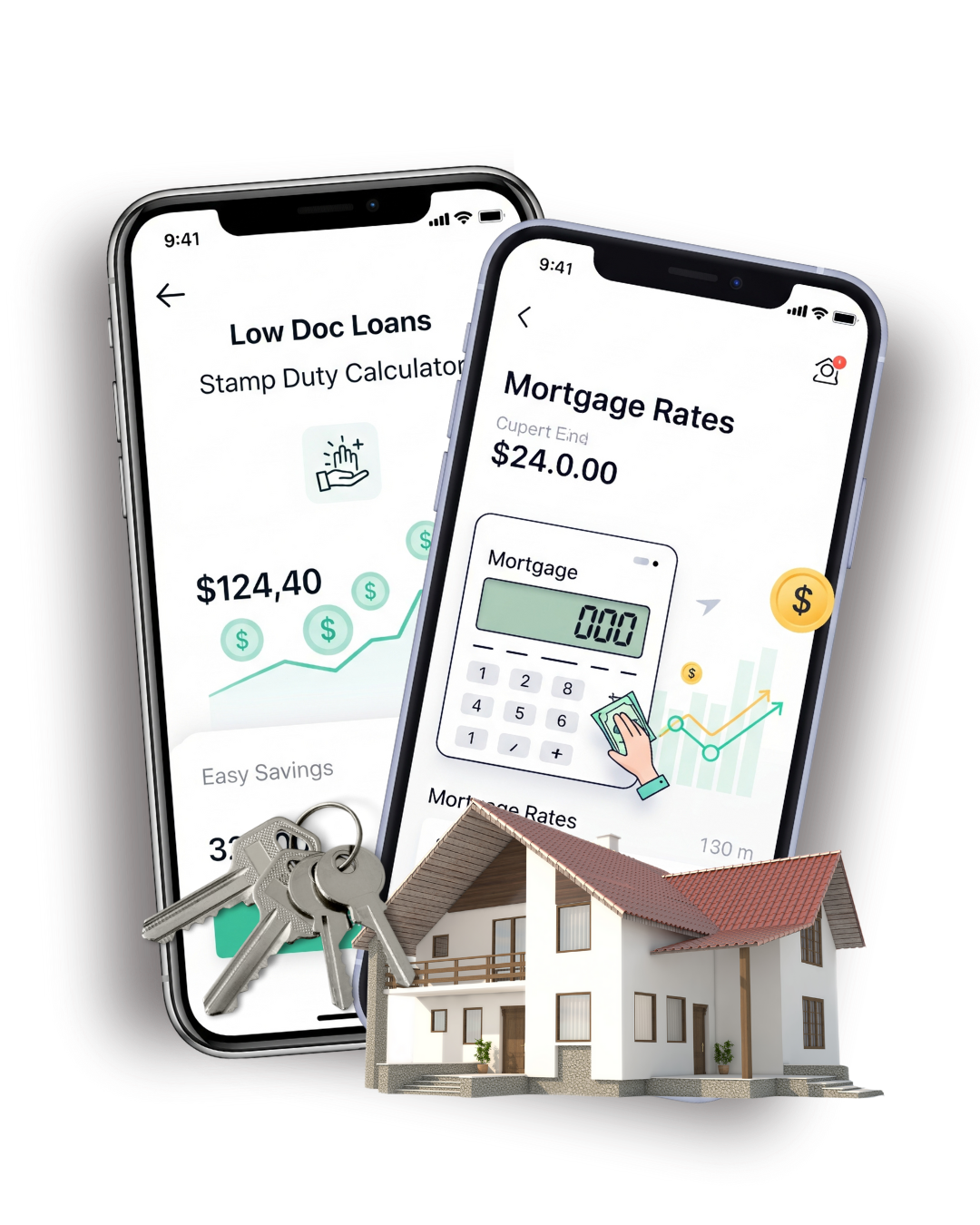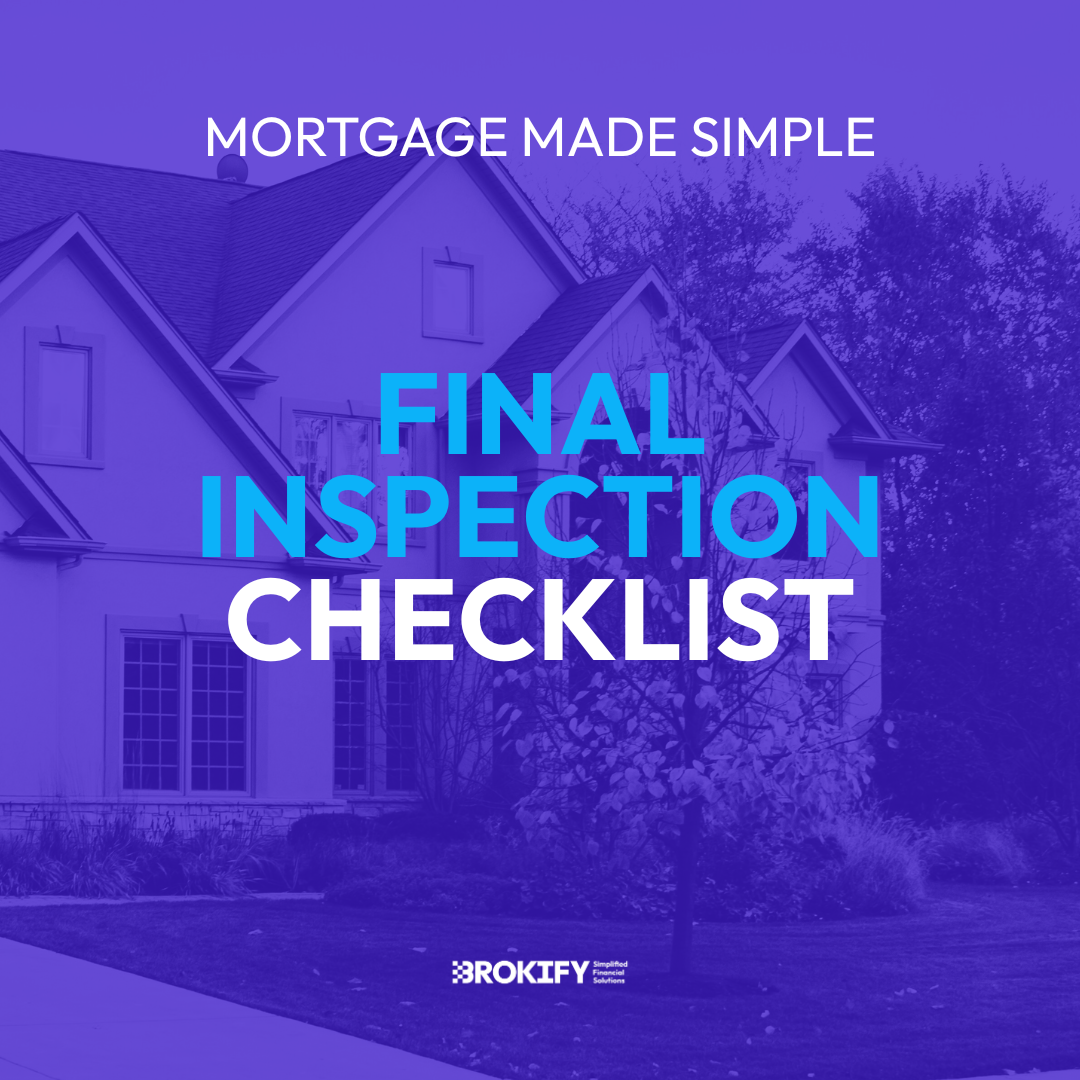Simplified Financial Solutions Based
Mortgage Broking Firm
We can help you
BUY YOUR DREAM HOUSE.
We aim to simplify the finance process of achieving the Australian Dream
We aim to simplify the finance process of achieving the Australian Dream
what are you looking for?
Borrowing Power Calculator
Property Insight Report
Book An Appointment
What does the application process look like?
Step 1 : Let’s Talk Goals
Visitors tell us about their plans — whether they are buying, refinancing, or just exploring. We then assign them a broker who understands their needs.
Step 2 : Get Prepped &
Pre-Approved
We assist in gathering documents, assessing their situation, and identifying suitable lenders. Our expert team supports the client every step of the way.
Step 3 : Secure Your Loan &
Settle In
After selecting the appropriate loan, we manage all paperwork and liaise directly with the lender. The client can focus on moving while we take care of the rest.
Why Choose Brokify?

TALK TO EXPERTS, NOT ROBOTS. We offer real guidance from experienced brokers.
WE MAKE IT SIMPLE. Clients receive clear, step-by-step support from start to settlement.
WE HELP YOU SAVE. We provide tailored loan options that maximise savings.
We are more than just home loans we support real people with real goals.
MEET THE TEAM
AT BROKIFY

Shaun Lee
Director & Founder

Alex Choi
Mortgage Broker

Johnny Xu
Mortgage Broker

Rachel Cheng
Mortgage Broker

Angelika
Senior Admin

Stella
Senior Admin

Hannah
Admin
Are you our next SUPERSTAR broker?
Mortgage Broker
We're always on a look out for our next SUPERSTAR to help our clients!
Reach out to one of us to see how we can help you reach your full potential!
Join the growing number of Australians
securing better home loans with Brokify.
FREE DIGITAL DOWNLOADS






MUST-READ MORTGAGE AND FINANCING ARTICLES

Home Loan Pre-Approval in Australia: Why It’s Your Secret Weapon
Home Loan Pre-Approval in Australia: Why It’s Your Secret Weapon for Smarter Home Buying
In Australia’s competitive real estate market, buyers need every advantage to secure the best deal. Home loan pre-approval provides a clear picture of your borrowing capacity before you start house hunting. This process sets a financial benchmark, streamlines negotiations, and strengthens your position in competitive bidding situations. With fluctuating interest rates and evolving lending policies, pre-approval is an essential first step for securing property in Australia.
Pre-approval means lenders have assessed your financial situation—credit score, income, existing debt, and overall stability—to determine how much you can borrow. It offers a realistic budget for managing expenditures and prevents overextension. Both first home buyers and seasoned investors benefit from improved negotiation power and the ability to lock in competitive interest rates. The following sections explain what home loan pre-approval involves, its strategic importance, who should consider it, how to apply, the costs and fees, a comparison with other approval stages, and answers to common questions.
What Is Home Loan Pre-Approval and How Does It Work in Australia?
Home loan pre-approval is an evaluation process where lenders determine the maximum amount you can borrow based on your financial profile. In Australia, this review covers income, credit history, and current financial commitments before granting provisional approval for a home loan. Essentially, it is a conditional agreement that helps you understand your price range and reduces uncertainty during your home search.
What Does Pre-Approval Mean for Australian Homebuyers?
For Australian buyers, pre-approval means lenders have conducted an initial review of your finances and are prepared to lend you a specific amount, subject to final verification of property details. This status enhances your credibility in the eyes of sellers by showing that you have passed a preliminary credit check. Sellers are reassured that financing issues are unlikely to derail the transaction, helping you negotiate confidently and possibly secure better purchase terms.
How Do Lenders Assess Your Pre-Approval Application?
Lenders review several key factors in your pre-approval application: - Verification of income through employment records and recent payslips. - Calculation of debt-to-income ratios. - Examination of your credit score and credit history. - Assessment of savings, especially for the down payment. - Review of ongoing financial obligations.
Each lender may have its own criteria, but the overall benchmark is similar. Accurate documentation and a strong credit history are critical. This thorough assessment provides assurance that your eventual loan repayment will be manageable.
What Documents Are Needed for Home Loan Pre-Approval?
Typically, you will need to provide: - Proof of Identity: Passport or driver’s licence. - Income Verification: Recent payslips, tax returns, and employment contracts. - Bank Statements: Usually covering the past three to six months. - Credit History: A recent credit report. - Debt and Liability Information: Details of existing loans and credit cards. - Additional documents such as employment letters or evidence of assets may also be required.
Gathering these documents in advance can streamline your application and boost your position in a competitive market.
Why Is Home Loan Pre-Approval a Strategic Advantage for Buyers?
Pre-approval provides clarity on your borrowing capacity, allowing you to focus on properties within your budget. It also speeds up the buying process by reducing uncertainty and shortening the time needed for lender evaluations at the final stage. Importantly, it demonstrates financial credibility to sellers, which is crucial in a market where multiple offers are common. Many real estate agents and sellers prefer buyers with pre-approval, sometimes even giving them preferential treatment.
How Does Pre-Approval Strengthen Your Buying Position?
When you are pre-approved, your offer becomes more appealing because sellers see you as a serious and financially reliable buyer. This reduces risks during the transaction and may accelerate deal closure. Sellers are more likely to favor pre-approved buyers and may offer better terms or discounts. This strengthened position is a key benefit, particularly in competitive bidding scenarios.
Can Pre-Approval Help You Lock in Better Interest Rates?
Yes, obtaining pre-approval can help secure competitive interest rates. Lenders are often willing to negotiate rates with pre-approved borrowers, and acting during periods of lower interest rates can protect you from future increases. This proactive step ensures you benefit from optimal conditions before finalizing your property purchase.
How Does Pre-Approval Speed Up the Home Buying Process?
By completing much of the financial due diligence in advance, pre-approval minimizes delays during the final loan processing. When you find a property, only property-specific checks and some updated documentation are required. This efficient process reduces the risk of disruptions during contract negotiations and final approvals, allowing you to close the deal more quickly.
Who Should Consider Getting Home Loan Pre-Approval in Australia?
Home loan pre-approval is valuable for a wide range of buyers: - First home buyers who need to understand their budget and limit financial risk. - Seasoned investors who require a clear borrowing cap to expand their portfolios. - Buyers in competitive markets where multiple offers are common. - Individuals with less-than-perfect credit who can use pre-approval to identify areas for improvement.
Understanding your financial profile up front allows you to set realistic expectations and avoid the risks of overextending.
Why Is Pre-Approval Essential for First Home Buyers?
First home buyers face challenges like high property prices and strict lending standards. Pre-approval helps them know exactly how much they can safely borrow, preventing the disappointment of falling for properties outside their financial reach. It also assists in budgeting for down payments, stamp duty, and legal fees, guiding them through a complex market with greater confidence.
Should Property Investors Get Pre-Approval Before Buying?
For property investors, pre-approval is a critical step. It establishes a clear budget and strengthens your bargaining position. Investors benefit from knowing their purchasing limits, helping them quickly assess opportunities and negotiate better deals. This clarity can speed up acquisitions and improve overall return on investment.
How Do Credit Scores Affect Your Pre-Approval Chances?
Credit scores are central to pre-approval. A high credit score indicates reliable financial behavior and can lead to higher borrowing limits and better interest rates. Conversely, a lower score may result in stricter terms or lower loan amounts. Improving your credit score before applying not only increases approval chances but also secures more favorable loan conditions.
How to Apply for Home Loan Pre-Approval: Step-by-Step Guide
Applying for pre-approval involves several clear steps designed to ensure both you and the lender understand your financial situation: 1. Evaluate Your Finances: Review your income, debts, and savings. 2. Gather Documentation: Collect all required documents such as identification, payslips, tax returns, and bank statements. 3. Submit Your Application: Approach a lender or mortgage broker with your documents. 4. Receive Provisional Approval: The lender provides a provisional borrowing limit after initial review. 5. Prepare for Final Checks: When you select a property, complete the remaining verification steps.
This transparent process simplifies your home purchase.
Where Can You Apply for Pre-Approval: Banks, Brokers, or Online?
There are several routes to secure pre-approval: - Traditional Banks: Offer detailed in-person evaluations. - Mortgage Brokers: Can compare rates from various lenders. - Online Platforms: Provide fast, automated assessments through digital submissions.
Each option has its merits, so choose the one that best fits your personal needs and financial profile.
What Are the Common Pitfalls to Avoid During Application?
Some common issues can delay your pre-approval: - Incomplete or Inaccurate Documentation: Ensure all submitted information is current and correct. - Unrealistic Debt-to-Income Ratios: Assess your financial obligations honestly. - Failure to Disclose Liabilities: Omitting existing debts can lead to a revoked approval. - Excessive Hard Credit Inquiries: Too many inquiries may negatively impact your credit score.
Address these issues by keeping your documentation and financial information up to date, and consider consulting a financial advisor.
How Long Does Pre-Approval Last and When Should You Renew It?
Pre-approval is typically valid for three to six months. This period allows time for you to find a property, but if your search extends beyond this period or your financial situation changes, you will need to renew your pre-approval. Staying proactive and monitoring your financial status ensures that your approval remains valid when you’re ready to purchase.
What Are the Costs and Fees Associated With Home Loan Pre-Approval?
While pre-approval is generally free, some lenders may charge administrative or processing fees. These fees vary by lender and can sometimes be waived in competitive markets. There may also be indirect costs, such as minor credit score impacts from hard inquiries. Knowing these potential expenses helps you plan your budget effectively.
Are There Any Application or Processing Fees?
Some lenders charge a small fee during the pre-approval process to cover administrative costs. Although these fees are usually modest compared to the overall mortgage amount, it is wise to ask about them early so you can factor them into your budget.
How Does Pre-Approval Affect Your Credit Score?
The pre-approval process involves a hard credit inquiry, which may cause a temporary, minor dip in your credit score. However, if you maintain responsible financial behavior and avoid repeated inquiries in a short period, the impact is minimal compared to the long-term benefits of pre-approval in strengthening your negotiating position.
How Does Home Loan Pre-Approval Compare to Conditional and Unconditional Approval?
Pre-approval is just the first stage of the lending process. It differs from: - Conditional Approval: Granted after further documentation and a property appraisal, providing more specific terms. - Unconditional Approval: The final stage where all conditions have been met and the lender commits fully to providing the loan.
Understanding these stages helps you navigate the process efficiently and prepares you for each step of securing a home loan.
What Is the Difference Between Pre-Approval and Conditional Approval?
Pre-approval is based on your financial data and gives you a tentative borrowing limit. Conditional approval, however, is granted once additional conditions—such as a detailed property appraisal and further financial checks—are satisfied. This step moves you closer to obtaining the final unconditional approval.
When Does Unconditional Approval Occur in the Loan Process?
Unconditional approval is reached when the lender is fully satisfied with all requirements, including property appraisal, complete documentation, and final credit checks. At this stage, your loan is fully secured, allowing you to proceed confidently with the property purchase.
What Are the Common Questions About Home Loan Pre-Approval in Australia?
Below are some frequently asked questions that address common concerns related to home loan pre-approval.
Can Pre-Approval Guarantee Loan Approval?
Pre-approval does not guarantee final loan approval because it is based on an initial assessment of your financial situation. Final approval still depends on property-specific details, final documentation, and updated credit checks at settlement.
How Does Refinancing Affect Existing Pre-Approval?
Refinancing may require you to update your pre-approval, as lenders will reassess your financial situation before offering a new loan. It is important to inform your lender if your financial circumstances change, to avoid affecting your pre-approved terms.
Can You Get Pre-Approved for Different Property Types?
Yes, you can seek pre-approval for various property types, including residential, investment, and commercial properties. Note that requirements and lending limits can vary; for instance, investment properties might require a higher down payment or stricter terms. Clarify your intent with your lender to ensure that the approved terms match your intended purchase.
List: Key Documents Required for Pre-Approval
Proof of Identity – Government-issued documents confirm your identity.
Income Verification – Payslips, tax returns, and employment contracts establish stable income.
Bank Statements – At least three to six months of transactions provide insights into spending and savings.
Credit History – A recent credit report detailing your financial behavior supports a higher borrowing limit.
Debt and Liability Information – Documentation of existing loans and liabilities allows for accurate debt-to-income calculation.
List: Advantages of Obtaining Home Loan Pre-Approval
Increased Negotiation Power – Sellers favor buyers with secured financing.
Faster Loan Processing – Much of the paperwork is already reviewed, speeding up the process.
Clear Budgeting – Knowing your limits helps prevent overextending financially.
Competitive Edge in a Hot Market – Pre-approved buyers often receive preferential treatment.
Potential for Better Interest Rates – Early assessment can lock in favorable rates before market changes.
List: Common Pitfalls in the Pre-Approval Process
Incomplete Documentation – Missing or outdated records can delay the process.
Overestimating Income – Overstated income can lead to unrealistic borrowing limits.
Ignoring Existing Liabilities – Failing to disclose debts results in inaccurate assessments.
Frequent Hard Credit Inquiries – Multiple inquiries can lower your credit score.
Failing to Update Financial Information – Significant changes need prompt communication with your lender.
Frequently Asked Questions
Q: What are the main benefits of obtaining home loan pre-approval in Australia?
A: Pre-approval clarifies your borrowing capacity, strengthens your negotiation power, and speeds up the overall process by reducing final processing time. It also aids in locking in competitive interest rates.
Q: Does pre-approval guarantee that my home loan will be approved?
A: No, it is a conditional assessment based on your current financial status. Final approval requires further property-specific verification.
Q: How often should I renew my pre-approval if I have not yet found a property?
A: Pre-approvals typically last three to six months. Renew if your home search extends beyond that period or if your financial situation changes.
Q: Can I apply for pre-approval through online lenders, and are they as reliable as banks?
A: Yes, reputable online lenders offer competitive and quick assessments. Always ensure they are accredited and regulated by relevant authorities.
Q: What can negatively impact my home loan pre-approval status?
A: Inaccurate documentation, significant financial fluctuations, multiple hard credit inquiries, and undisclosed liabilities can all negatively affect your pre-approval.
Q: How does a strong credit score benefit me during the pre-approval process?
A: A strong credit score can lead to a higher borrowing capacity and more attractive interest rates, as it signals financial responsibility to lenders.
Q: Is pre-approval useful for both first home buyers and property investors?
A: Absolutely. It helps first home buyers understand their budget and empowers investors to negotiate more effectively.
Final Thoughts
Home loan pre-approval in Australia is a powerful tool for both first-time buyers and seasoned investors. It defines your borrowing capacity early, enhances your competitive position, and streamlines the purchasing process. By guiding you through meticulous financial assessments and ensuring that all documentation is in order, pre-approval not only speeds up buying timelines but also secures favorable interest rates. Embracing this process can transform your property acquisition journey into a more efficient and confident experience.
Frequently asked questions
Home & Property Loans
What's the difference between buying a home and building a home when it comes to loans?
Buying a home typically involves a standard home loan, while building a home may require a construction loan, which releases funds in stages as the building progresses.
Can Brokify help with pre-approval for a home loan?
Yes. We assist you in getting pre-approval so you know your budget before you start house-hunting.
What are the benefits of refinancing my current loan?
Refinancing can help reduce your interest rate, lower repayments, access equity, or consolidate debt. We'll help you compare your current loan with better options.
How does a Low Doc Loan work?
Low Doc Loans are designed for self-employed individuals who may not have traditional proof of income. We work with lenders who specialise in flexible documentation.
Investment, Business & Commercial Lending
Can Brokify help me invest in property through my SMSF?
Absolutely. We specialise in SMSF loans and can help you navigate the compliance and structuring required for property investment via your super fund
What is Development Finance and who is it for?
Development Finance is for property developers or investors undertaking construction or subdivision projects. We can tailor solutions for both small and large-scale developments.
What's the difference between Commercial Loans and Business Loans?
Commercial Loans are typically for purchasing property for business purposes. Business Loans, on the other hand, help fund day-to-day operations or expansion.
How do I qualify for Asset Finance?
If you're looking to purchase vehicles, equipment, or machinery, Asset Finance is ideal. We assess your business cash flow, credit history, and the asset itself.
Short-Term & Bridging Options
What is Bridging Finance and when should I consider it?
Bridging Finance covers the gap between buying a new property and selling your existing one. It's a short-term loan that helps you move without waiting.
Partnerships & Referrals
Do you offer referral programs for professionals or businesses?
Yes. We collaborate with real estate agents, accountants, and other professionals through our Referral Program. You refer, we reward.
How can my company partner with Brokify?
We offer corporate partnership opportunities for organisations looking to add value to their employees or clients with trusted lending services. Contact us to discuss custom partnership models.
General Loan Questions
What documents do I need to apply for a loan?
This depends on the type of loan, but generally includes ID, proof of income, assets & liabilities, and credit history. For Low Doc loans, alternative documents like BAS or bank statements may apply.
How long does the loan approval process take?
It can vary, but standard approvals take 3-7 business days. We'll keep you updated every step of the way.
Do you work with first home buyers?
Yes, and we also help you understand government schemes and grants you may be eligible for, like the First Home Owner Grant or First Home Loan Deposit Scheme.
Are your services available Australia-wide?
Yes. We work with clients all over Australia and can assist you remotely or in person, depending on your location.
OUR SERVICES











COMPANY
CUSTOMER HUB
BROKER HUB
PARTNER HUB



COLTO 2 Trust trading as BROKIFY PTY LTD & Shaun Lee are authorised representatives of Finsure Finance and Insurance Pty Ltd
ABN 72 068 153 926 under Australian Credit Licence Number 384704. | Australian Credit Representative Numbers for 568014 & 568015
© Copyright 2026. Brokify. All Rights Reserved. | powered by heystarky.com.au
















